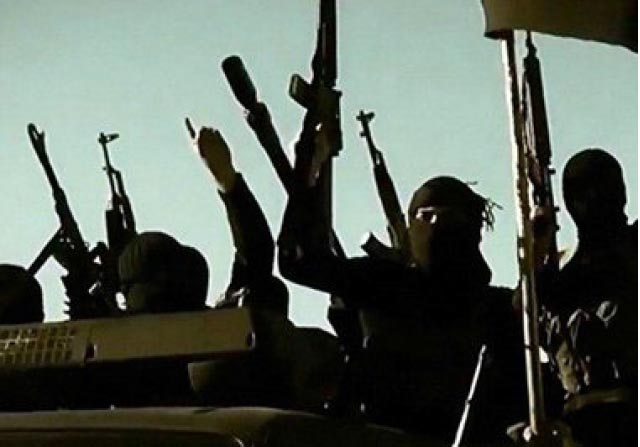Top American commander of the NATO forces in Afghanistan has warned that the Islamic State group is attempting to establish a regional base in Afghanistan in the eastern city of Jalalabad. In an interview with Associated Press, General Campbell said that “foreign fighters” from Syria and Iraq have joined Afghan fighters, who have allegiance to the Islamic State, in eastern Nangarhar province. He said that there are “signs” that supporters of the Islamic State in Nangarhar are trying to consolidate their relations with the group’s leadership in Syria and Iraq. The NATO commander said that IS wants to build a base in Jalalabad to use it as the main base for the so-called Khurasan province. The comments from the top US commander in Afghanistan is another warning for growing influence of the Islamic State group in Afghanistan.
The so-called Islamic State group has been in fierce fighting with the Taliban in recent months. There are reports that dozens of militants from both the Taliban and the Islamic State have been killed during infighting between the groups in eastern Nangarhar province and other areas such as Nimroz, Ghazni and Zabul provinces. The fresh warning over expansion of the Islamic State group is coming at a time when insecurity is further spreading in Afghanistan with various militant groups increasing their militant activities across the country. A recent semi-annual report of the Pentagon to US Congress said that the Taliban has stayed active in ‘traditional strongholds’ and overall security situation in Afghanistan has deteriorated in the second half of 2015. The warning is coming also at a time when the Taliban are suffering from an internal split which may cause further infighting among different branches of the once united Taliban led by the group’s former leader Mullah Muhammad Omar. In recent months, there have been clashes between two main rival Taliban groups led by Mullah Akhtar Mansoor and Mullah Rassoul.
Gen. Campbell has said that many of those who have allegiance to the Islamic State of Afghanistan are “the disgruntled members of the Taliban.” Given the recent split of the Taliban after announcement of death of Mullah Omar, there is the possibility of even more infighting among the Taliban and more defects of Taliban’s disgruntled members into the Islamic State ranks. The infighting Taliban rival groups and the erosion of the both the main Taliban faction and other splinter groups may provide an appropriate environment for the Islamic State to further grow and expand its influence across the country in particular eastern province of Nangarhar. Though there is profound grassroots resistance among the Taliban against the creeping influence of the Islamic State in Afghanistan, the activities of various militant groups may also work as a driver forcing militants to join the more organized and formidable Islamic State.
The bitter resistance of the Taliban against emergence of the Islamic State group in Afghanistan is something helpful for preventing the group to establish bases and expand its power across the country. The government of Afghanistan is not fully equipped politically and militarily to counter the influence of the Islamic State group and defeat it at the initial phases of its emergence. While the Afghan government and its military agencies are involved in tackling various threats stemming from the militant groups, it fails to sufficiently focus on fighting the Islamic State group. The menace of the Islamic State has been growing, though at a slow pace, across the country in recent months. Though the Afghan government’s counter terrorism military operations have been underway against the group, it is the Taliban who have been playing a deterring role against the Islamic State. However, the Taliban’s anti-Islamic State fighting has not stopped the group, and may not do so in the future as well.
Integration of relations between the Islamic State group in Afghanistan with the leadership of the main group in Iraq and Syria is a major threat for security and stability of Afghanistan. However, the threat would not remain contained to Afghanistan. It would further destabilize the region including Pakistan and the Central Asian states in the north. Therefore, all involved parties including the government of Afghanistan and other regional and world players need to play an active role in fighting the influence of the Islamic State group in Afghanistan. The Afghan government and its NATO supporters should devise more comprehensive plans against the Islamic State which includes regional players such as Iran, Pakistan. The governments of Afghanistan, Iran and Pakistan have a relatively common ground on Islamic State’s influence in Afghanistan. All the three neighbors as well as Russia and the Central Asian neighbors are opposed to the growing influence of the Islamic State in Afghanistan. The United States and the Afghan government need to use the potential capacity for a regional cooperation in some of formal or informal ways for stopping the Islamic State group.
The government of Afghanistan’s peace initiative with the Taliban would be crucially endangered if the Islamic State group manages to further expand its power in Afghanistan. Any peace negotiations with various militant groups would be already difficult for the government of Afghanistan. Considering a more powerful Islamic State group in Afghanistan, any sort of peace negotiations with the militant groups would be in vain. There is the possibility for the government to cut some sort of peace deal with the main Taliban faction in the future. However, there are many spoilers for a potential peace process in Afghanistan, one of which is the Islamic State group of the so-called Khurasan province. The Islamic State also pursues a more dangerous agenda of ethnic and religious hatred among the different ethnic groups in the country. Given the group’s potential threats to the future of the country, the government of Afghanistan and its international backers need to stop the menace of the threat of the Islamic State and prevent it from gaining more influence and power.

